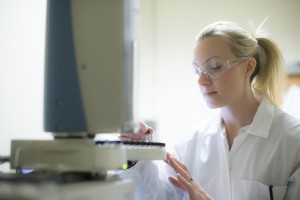 Elaine O’Reilly is in the School of Chemistry at the University of Nottingham, and works on the development of biocatalysts and biocatalytic methodology.
Elaine O’Reilly is in the School of Chemistry at the University of Nottingham, and works on the development of biocatalysts and biocatalytic methodology.
1. What made you want to be a chemist?
I originally went to University to study genetics, having been fascinated with Charles Darwin and his theory of evolution and natural selection from a young age. During my degree at University College Dublin, I took chemistry as one of four choices in first year with the intention of dropping it as soon as possible. I would love to say that the subject captivated me from the onset but in reality, I really struggled with it. Thanks largely to help from one of my lecturers (Prof. Earle Waghorne – thank you!) and a good group of friends, I managed to scrape by. It was in second year that I started to really enjoy chemistry and after spending time in a research lab in my final year, I realized that I was hooked.
2. If you weren’t a chemist and could do any other job, what would it be — and why?
I would love to be an actress on the West End! Aside from the fact that I can’t sing or dance, I would be absolutely perfect! My mum, Phyllis, always told me I was a real ‘abbey actor’ when I was a child and I think I still am.
3. What are you working on now, and where do you hope it will lead?
We are trying to develop biocatalysts that will convert abundant materials into high-value chemicals and pharmaceuticals. Our overall aim is that we will have a ‘toolbox’ of (engineered) enzymes available for a much wider range of synthetic transformations, with a particular focus on those that are challenging or impossible using a more traditional chemical approach. My ambition is for our research to make a real difference in peoples’ lives and if we achieved this directly with our science, I could retire happy. However, perhaps on a smaller scale, I try to be a good mentor to the next generation of scientists, who have the ability to make a powerful impact on people’s lives. I like to think I do the best I can for students who choose to work in my laboratory with the hope that they will become far more capable scientists than I am and truly make a difference.
4. Which historical figure would you most like to have dinner with — and why?
I suspect that he gets a lot of fantasy dinner invites, but it would have to be Charles Darwin. His work has fascinated me for many years and I would love to hear how his theories and ideas were carved out. His research not only directly inspires the work we undertake in our laboratory (directed evolution and protein redesign), but has shaped the way we all look at the world around us.
5. When was the last time you did an experiment in the lab — and what was it?
I have been on maternity leave since August 2016 so between that and being pregnant, I have mostly avoided the lab. The last time I was active was in 2015 and I was trying to develop a high-throughput screening strategy to enable the directed evolution of transaminase biocatalysts. This involved synthesizing some diamines, which should have been easy (it wasn’t). I have since passed the task over to one of my students.
6. If exiled on a desert island, what one book and one music album would you take with you?
I would take How to Survive on a Desert Island’ by Tim O’Shei and Michael Jackson’s Off the Wall.
7. Which chemist would you like to see interviewed on Reactions — and why?
I would like to see Prof. Donald Hilvert interviewed. His group is doing some inspiring work in a similar area to our own.





Please sign in or register for FREE
If you are a registered user on Research Communities by Springer Nature, please sign in